
Reactions
metrics 2024
Catalyzing Innovation in Chemical Research
Introduction
Reactions is a dynamic open-access journal published by MDPI, dedicated to the advancement of research in the fields of Chemical Engineering and Chemistry. Launched in 2020, the journal aims to provide a platform for scientists and researchers to share their findings and innovations, facilitating the synthesis and dissemination of knowledge within the global academic community. With an impact factor that reflects its growing influence, Reactions ranks 47th in the Chemical Engineering category and 72nd in Chemistry on Scopus, placing it within the vibrant landscape of contemporary chemical research. Housed in the picturesque city of Basel, Switzerland, the journal is committed to open access, ensuring that its high-quality content is readily available to all. This commitment not only enhances visibility but also fosters collaboration among researchers, professionals, and students striving to push the boundaries of chemical sciences. As we look towards 2024 and beyond, Reactions continues to encourage submissions that explore groundbreaking methodologies, innovative applications, and transformative theoretical frameworks in chemistry and chemical engineering.
Metrics 2024
 -
- 2.20
2.20 2.10
2.10 -
-Metrics History
Rank 2024
IF (Web Of Science)
JCI (Web Of Science)
Quartile History
Similar Journals
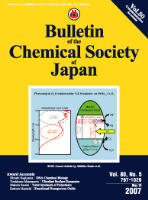
BULLETIN OF THE CHEMICAL SOCIETY OF JAPAN
Driving Innovation: Transforming Chemistry Through ResearchBULLETIN OF THE CHEMICAL SOCIETY OF JAPAN, published by the esteemed Chemical Society of Japan, serves as a pivotal platform for the dissemination of cutting-edge research in the multifaceted field of chemistry. With an ISSN of 0009-2673 and an E-ISSN of 1348-0634, this journal has been integral in fostering the growth of chemical sciences globally since its inception in 1965. The journal holds an impressive Q2 ranking in the Chemistry (miscellaneous) category, indicating its relevance and influence within the academic community, as reflected by its Scopus rank of #104/408, placing it in the 74th percentile. Although it is not an open-access journal, its rich content, which spans a wide range of topics in general chemistry, remains highly valued by researchers, professionals, and students alike, affirming its crucial role in advancing both theoretical knowledge and practical applications in chemistry. As it converges towards 2024, the bulletin continues to uphold its commitment to excellence in scientific communication and research dissemination in Japan and beyond.
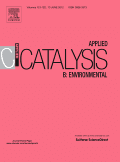
Applied Catalysis B-Environment and Energy
Transforming environmental challenges into innovative solutions.Applied Catalysis B-Environment and Energy, published by Elsevier, is a leading journal in the fields of catalysis, environmental science, and process chemistry, with an impressive impact factor that reflects its significance in advancing research and innovation. Established in 1992, this esteemed journal has earned a prestigious status as evidenced by its 2023 category quartiles—ranking in the Q1 category for Catalysis, Environmental Science, and Process Chemistry and Technology. With consistently high rankings in the Scopus database, it holds a remarkable position as #1 in General Environmental Science and #2 in both Process Chemistry and Catalysis, showcasing its profound impact on the respective fields. The journal’s scope encompasses both theoretical and practical research, targeting the pivotal developments in catalysis that promote sustainable practices and energy efficiency. Researchers, professionals, and students alike will find invaluable insights and cutting-edge studies published within its pages, making it an essential resource for those invested in pioneering advancements for a greener, more energy-efficient future.

Chemical Methodologies
Unlocking the Potential of Chemical MethodologiesWelcome to Chemical Methodologies, a premier journal published by SAMI PUBLISHING CO-SPC, dedicated to advancing the field of chemistry through innovative research and methodologies. With an ISSN of 2645-7776 and an E-ISSN of 2588-4344, this journal provides a vital platform for researchers and scholars to share their findings in areas encompassing physical, theoretical, and organic chemistry. Despite its initial HIndex and quartile rankings still being established, the journal's evolving impact within the academic landscape is underscored by its Scopus Ranks, which place it in the 35th percentile for physical and theoretical chemistry and the 33rd percentile for organic chemistry. Since its inception in 2022, and continuing through 2024, Chemical Methodologies aims to foster collaboration and knowledge dissemination among academics and practitioners alike, bridging theoretical concepts and practical applications. This open-access platform enhances accessibility for researchers and students worldwide, ensuring that groundbreaking contributions to chemical science reach a broad audience.
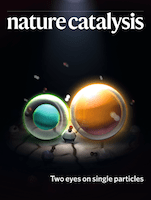
Nature Catalysis
Pioneering Research at the Intersection of Science and EngineeringNature Catalysis is a premier academic journal published by NATURE PORTFOLIO, specializing in the rapidly evolving fields of biochemistry, bioengineering, and catalysis. With its ISSN of 2520-1158, this journal has emerged as an invaluable resource since its inception in 2018, contributing significantly to interdisciplinary research. Recognized for its high impact within the scientific community, it holds a prestigious Q1 ranking across multiple categories, including Biochemistry, Process Chemistry and Technology, and Catalysis as of 2023, illustrating its influence and authority in the field. Researchers will find impactful articles characterized by rigorous peer review processes that push the boundaries of knowledge in catalysis and its applications. While the journal operates with traditional access models, it remains accessible to a global audience interested in innovative research findings that promise to shape future developments in these critical areas. Positioned at the forefront of contemporary scientific inquiry, Nature Catalysis invites contributions that expand upon catalytic processes and technologies, which are crucial for advancing both fundamental science and applied engineering.

RUSSIAN JOURNAL OF APPLIED CHEMISTRY
Advancing the Frontiers of Applied ChemistryRUSSIAN JOURNAL OF APPLIED CHEMISTRY, published by PLEIADES PUBLISHING INC, serves as a pivotal platform for advancing knowledge in the fields of chemical engineering and general chemistry. With an ISSN of 1070-4272 and an E-ISSN of 1608-3296, this journal has been in continuous publication since 1995 and is set to continue until 2024. Although it operates without an open access model, researchers can access a wealth of innovative research findings, critical reviews, and insightful discussions that reflect the current trends and challenges in applied chemistry. Its rankings place it in Q3 quartiles for both Chemical Engineering and Chemistry as of 2023, indicating its emerging influence within these disciplines. The Scopus rankings further highlight its relevance, positioning it in the lower percentiles, suggesting a fertile ground for researchers aiming to elevate the field. Engaging with this journal can enrich academic and professional understanding, making it an essential resource for anyone dedicated to furthering their expertise in applied chemistry.

INDIAN JOURNAL OF CHEMICAL TECHNOLOGY
Advancing Innovation in Chemical TechnologyThe Indian Journal of Chemical Technology, published by the Natl Inst Science Communication-NISCAIR, is a pivotal platform for the dissemination of innovative research in the field of chemical technology. With an ISSN of 0971-457X and an E-ISSN of 0975-0991, this journal has been serving the academic community since its inception in 1994, and is set to continue through 2024. The journal holds a Q4 ranking in both the Chemical Engineering and Chemistry categories as of 2023, though it showcases a significant breadth of research, making it a valuable resource for both emerging and established scholars. Although it currently operates without an open-access model, the journal aims to facilitate knowledge exchange through rigorous peer-reviewed publications, allowing researchers and professionals to stay updated with the latest advancements and practices in chemical technology. Located in New Delhi, India, the journal not only contributes to national scientific dialogue but also plays a key role in the global conversation around chemical sciences by addressing unique challenges and innovations pertinent to the region.
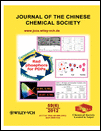
JOURNAL OF THE CHINESE CHEMICAL SOCIETY
Fostering Knowledge in the Evolving World of ChemistryJOURNAL OF THE CHINESE CHEMICAL SOCIETY, published by WILEY-V C H VERLAG GMBH, is a vital resource in the field of chemistry, focusing on a broad array of topics pertinent to general chemistry and its advancing sub-disciplines. Established in 1954 and running through 2024, this journal serves as a significant platform for the dissemination of high-quality research, showcasing innovative findings and developments within the chemical sciences. With its Q3 category ranking and positioning at Rank #203 in General Chemistry per Scopus, it reflects the journal's commitment to research excellence and impact. While not an open-access publication, it ensures accessibility to a global audience, making it an essential tool for researchers, professionals, and students alike seeking to stay informed and engaged in the evolving landscape of chemistry.
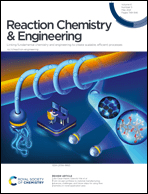
Reaction Chemistry & Engineering
Pioneering Research for Tomorrow's Chemical ChallengesReaction Chemistry & Engineering is an esteemed journal published by the Royal Society of Chemistry, dedicated to advancing the field of chemical engineering. With a focus on pivotal topics including catalysis, process technology, and fluid flow, this journal serves as a critical platform for researchers and professionals seeking to disseminate innovative findings and methodologies. As of 2023, it boasts impressive impact factors, ranking Q2 in Catalysis and consistently appearing in the Q1 categories for several related fields, thus recognizing its influence and relevance in the scientific community. With Scopus rankings placing it among the top 30 journals in multiple chemical engineering categories, Reaction Chemistry & Engineering encourages open dialogue and collaboration among scientists aiming to overcome contemporary challenges in chemical processes. This journal is vital for anyone involved in the development and application of chemical engineering, providing essential insights and fostering progress in this dynamic discipline. Explore the latest research and contribute to future innovations by engaging with the cutting-edge work presented in Reaction Chemistry & Engineering.
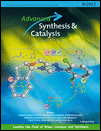
ADVANCED SYNTHESIS & CATALYSIS
Empowering researchers to transform chemical processes.ADVANCED SYNTHESIS & CATALYSIS is a prestigious academic journal published by Wiley-VCH Verlag GmbH, based in Germany. This journal, with ISSN 1615-4150 and E-ISSN 1615-4169, plays a pivotal role in the fields of Chemistry and Chemical Engineering, earning commendable rankings such as Q2 in Catalysis and Q1 in Organic Chemistry in 2023. Its high impact factor and recognition—ranking #18 in both Organic Chemistry and Catalysis—further underscore its significance as a platform for groundbreaking research and innovative methodologies. Spanning from 1996 through 2024, ADVANCED SYNTHESIS & CATALYSIS aims to disseminate high-quality, cutting-edge studies related to synthetic processes and catalytic technologies, ensuring accessibility via their open access options. By fostering a vibrant scholarly community, this journal serves as an essential resource for researchers, professionals, and students dedicated to driving advancements in synthetic and catalytic chemistry.

Nature Synthesis
Empowering Researchers to Shape the Future of ChemistryNature Synthesis, published by SpringerNature, is a premier peer-reviewed journal dedicated to advancing the field of synthesis in chemistry and materials science. With an impressive impact factor and categorized in the Q1 quartile for Chemistry (miscellaneous), Inorganic Chemistry, Materials Chemistry, and Organic Chemistry, it ranks prominently among its peers, reflecting its high-quality research output and relevance.
This journal provides a platform for researchers, professionals, and students to publish innovative synthesis methodologies, novel materials, and interdisciplinary approaches that push the boundaries of chemistry. Operating under an Open Access model, it ensures that research is widely accessible, fostering collaboration and engagement across the global scientific community.
Situated in the United Kingdom, Nature Synthesis is committed to contributing to the scientific discourse from 2022 to 2024, and beyond, as it continues to highlight significant advancements across chemistry domains.